Stuart has worked as Farm Manager at Farrington Oils for 2 years. Growing up on a dairy and arable farm in Staffordshire, he learnt his craft under the guidance of his father: a passionate advocate for integrated farming methods that improve habitats, support wildlife-friendly farming, and promote soil health.
Having worked at various farms during his career so far, Stuart has gained a diverse set of agricultural skills that he now applies here at Bottom Farm, a LEAF Marque certified site. And his nature-first focus is perfectly aligned with our commitment to sustainable agriculture and low-impact farming practices. We sat down with him to find out more about his role.
What does a typical day look like for you?
As well as helping to sow, nurture and harvest the rapeseed for our Mellow Yellow oil, I’m responsible for crop management, combining and drilling, agricultural machinery repairs, building maintenance, purchases and sales. It’s a hands-on role that blends traditional farming techniques with modern sustainable farming tools.
When did you gain an interest in regenerative farming?
Every farming job I’ve had has taught me new skills, but something always sat wrong with me. I couldn’t help thinking — if all the cultivation, sterile fields, over (and under) managed hedges, and synthetic additives were good, then where is the nature?
It wasn’t until I started working with Duncan that I fully embraced regenerative farming practices. We began implementing nature-friendly methods that prioritise sustainability, biodiversity, soil regeneration, and habitat restoration — and I haven’t looked back.
What’s the best part of your role as Farm Manager?
That I’m trusted to run the farm independently. I have support when needed, but being able to manage operations — from seasonal crop planning to equipment upkeep — suits me perfectly. It’s a rewarding balance of autonomy and teamwork.
And the biggest challenge?
Learning the quirks of the land and trying to absorb decades of the owners’ experience in just a few short seasons. I’d also be doing farmers everywhere a disservice if I didn’t mention the weather — the one factor that never stops challenging us, especially when it comes to soil moisture and harvest timing.
Fondest memory?
At the end of my first drilling season in October 2023, I’d just finished the final field and was packing up the drill as Duncan completed the last of the harrowing behind me. The rain began with only two runs left — but we pushed through and got it done. Remarkably, it didn’t dry up again until the following March. That moment captured the resilience and rhythm of British farming life.
How has this year been on the farm?
A lack of soil moisture, combined with prolonged dry and sunny conditions, led to one of our poorest wheat harvests to date. Still, there’s a silver lining — we’ve completed all the drilling, and the first shoots are now breaking through the soil. As for what lies ahead between now and harvest 2026? Who knows. But whatever the season brings, we’ll get the grain in the sheds and do it all again, just as we always do.
Harvest is the high point of the farming year—equal parts adrenaline, exhaustion, and dry British humour. It’s when neighbours rally, teasing each other about the weather while sharing a quiet understanding of the hard graft behind the scenes.
This year, nature threw us a curveball. After a wet autumn that left seeds struggling in sodden soil, the rain stopped abruptly in February. From March to June, we had less than a third of our usual rainfall and record-breaking heat—just when crops needed moisture most. Plants rushed through their growth stages, desperate to set seed before the heat overcame them.
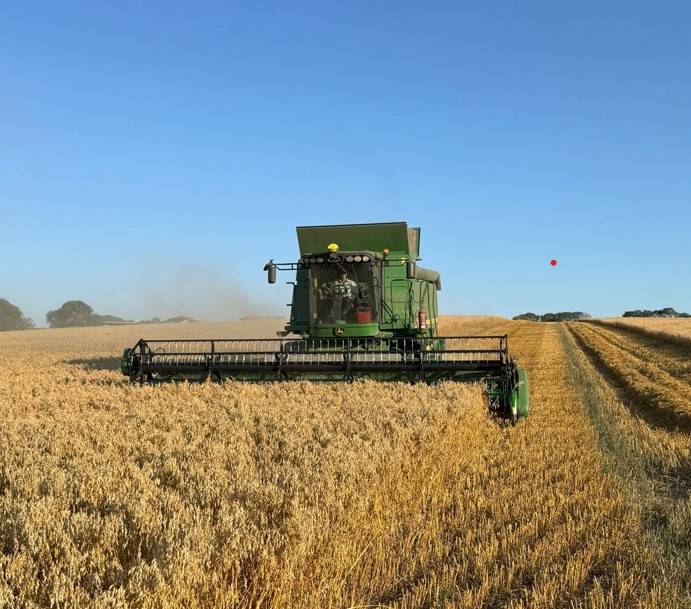
Our combine harvesting oats
The result? An unusually early harvest and frustratingly low yields. We began combining wheat on 14th July—weeks ahead of schedule—on light land that had completely dried out. The yield was half of what we’d expect, though at least it was dry, saving us on drying costs. Heavier clay soils fared slightly better, but still came in around 20% below average.
Rapeseed was a pleasant surprise. Back in March, we weren’t sure we’d get much at all, but it rallied. Yields were still down, but prices held up better than wheat, which has slumped globally.
Then came another curveball. On the final stretch of rapeseed, our 15-year-old combine developed a worrying noise. A worn bush in the grain separation sieves led to a week-long repair job at the local depot (accompanied by a bill the size of a small family car). In a year of poor yields and low prices, it was a bitter pill. But the machine’s now good for several more seasons, and buying a new one (at the cost of a small house) is simply not an option.
We got back to work, finished the rapeseed, and moved on to wheat, beans (a disaster), and finally spring oats, which thankfully met expectations. We wrapped up on 7th August. The grain store isn’t full, and prices are disappointing, but we’re done. Safe. And already thinking about what we’ve learned and how to do better next year.
Farmers are often accused of never being happy—but really, we’re just realists. We can’t control the weather. We take what nature gives, adapt, and carry on. Because deep down, we believe next year will be better. It always starts again. And when the rain finally comes—probably all at once—we’ll be grumbling about that too.
Growing rapeseed isn’t for the faint-hearted. It’s a crop that keeps us guessing—and keeps pests well-fed! But we love a challenge and this past year presented many of them.
We planted the crop last September in perfect conditions. Warm soil, gentle rain, and a fertility-boosting companion crop gave our seedlings the best start imaginable. Things looked promising heading into winter… until flocks of hungry pigeons moved in like they’d booked an all-inclusive holiday on our fields.
Cue months of pigeon patrol. Stuart and I tried everything—shooing, shifting, and sighing our way through winter as the birds munched away. By February, I worried we’d have nothing to show visitors for Mellow Yellow’s 20th anniversary.
Then came spring—and hope. Longer days, warmer temperatures, and suddenly, our battered plants began to bounce back. Leaf by leaf, they transformed into leafy solar panels, soaking up sunshine and surging forward. It was magical watching recovery in real time.
But nature wasn’t done with us. In June, aphids arrived, eyeing our pods like a buffet. Luckily, our farm’s biodiversity superheroes—ladybirds—swooped in and cleared the decks. No chemicals needed, just nature doing its thing.
Fast forward to July, nearly 11 months after planting, and we’ve harvested a crop we’re proud of. The yield might be modest, but given the challenges, it’s a triumph. Now it’s off for pressing, and come September, you’ll find our golden Mellow Yellow rapeseed oil on shelves, ready for your table.
A resilient crop. A passionate team. A truly mellow miracle.
We believe farming can—and should—work in harmony with nature. And one of the quiet yet powerful ways we do this is through our wildflower margins.
Wildflower margins are strips of land, often along field edges, that we intentionally plant and maintain with native wildflowers. They may not be the headliners of the farm, but they’re doing essential work behind the scenes. Here’s why they’re such an integral part of what we do:
Creating a Wildlife Haven
Wildflower margins offer a vital habitat for bees, butterflies, birds, and other wildlife. At a time when pollinator populations are struggling globally, these little strips of land are lifelines—bursting with pollen, nectar, and safe havens.
Natural Farm Helpers
These areas attract beneficial insects such as ladybirds and beetles that help control pests, reducing the need for chemicals and enabling our fields to breathe a little easier. They also improve soil health and water quality by acting as natural filters.
Farming With Purpose
For us, wildflower margins reflect care and responsibility. They take time to grow, but their impact—on biodiversity, beauty, and balance—is far greater than their footprint.
Looking to the Future
More than field edges, these margins connect farming with conservation. They’re part of our promise to leave the land richer than we found it. We’ve watched rare butterflies take flight along these margins, heard skylarks’ song nearby, and even spotted rare orchids emerge amongst the carpet of flowers. It’s these small daily encounters with wildlife that remind us we’re doing something worthwhile.
Read more about our sustainability mission and the work we do here on the farm to promote biodiversity.
We were thrilled to welcome the team from Young’s Pubs to our farm in Northamptonshire to give them a first-hand look at how we grow and press our award-winning rapeseed oil. Development Chef, Holly and her team joined founder, Duncan and Commercial Manager, Rachel in our golden fields to explore what we call the ‘process of no process’.
From planting and harvesting our rapeseed to the simple yet careful steps of pressing, filtering, and bottling, we were delighted to share the Mellow Yellow life cycle with one of our most important customers. But more than just a visit, this was an opportunity to bring grower and chef together—to deepen the understanding of ingredients at their source and celebrate the best of British food.
We know that when chefs connect directly with the land and the people who grow the food, incredible things happen. We’ve experienced it many times with local chef James Peck, back in November when Executive Project Chef, Dang Pham from Lexington Catering came to visit, and again more recently when Executive Chef, Stuart Purdy from Bespoke Food Group joined us for a full farm tour. Similar sentiments were echoed by Michelin star chef and friend, Adam Gray in an interview with Mash + Mint about his life in food. Adam has been using Mellow Yellow for the past 20 years and is a great example of a chef who cares deeply about provenance and seasonality.
When a connection is made, the appreciation for quality, sustainability, and innovation in the kitchen only grows stronger, creating dishes that champion real flavour and provenance.
A huge thank you to Young’s Pubs for making the journey—here’s to more collaborations that bring field-to-fork storytelling to life.
This year marks 20 incredible years since Duncan pressed the first batch of seeds into our Mellow Yellow cold-pressed rapeseed oil. What started as a small business idea to diversify the family farm in Northamptonshire, has grown into a national success, with bottles aligning supermarket shelves and serving as the oil of choice in some of Britain’s top restaurants.
Whilst a huge amount has happened in 20 years, one thing has remained unchanged: our commitment to simplicity and excellence using a very simple process of production.
As a brand we’ve always remained steadfast that cold pressed rapeseed oil is very much our homegrown version of imported olive oil. And whilst we believe there is a place for every oil at the table, we are proud to offer an oil that is grown and produced sustainably, that’s carbon neutral, offers great health benefits and huge versatility in the kitchen.
The early days…
Back in 2005, Duncan Farrington and his mother produced the very first batch of Mellow Yellow. Armed with the first bottles of golden oil, Duncan loaded up his battered old Golf car and drove around local shops, securing eight customers—and a speeding ticket in Northampton for his enthusiasm!
One of those early customers, a local butcher, was hesitant at first. But after Duncan explained how Mellow Yellow creates the perfect sear on meat as well as gorgeous golden roast potatoes, he agreed to give it a go. Two weeks later, he called back—he needed more oil. That shop has been a loyal customer ever since.
Whilst Duncan was working on farming, production and sales, Eli was busy in the farmhouse kitchen testing out recipes and dressings using Mellow Yellow. That same kitchen remains the hub of the brand today; the place where new products emerge and delicious seasonal recipes are founded.
Phenomenal Growth, Same Pure Quality
Mellow Yellow has grown exponentially beyond those first few bottles. What started with one press in a grain store has expanded to 18 presses, a new warehouse, and a 14-person team. In fact, we can now bottle as much oil in a single day as we sold in our entire first year!
Along the way, we’ve won prestigious awards, secured national listings with Waitrose and Sainsbury’s, and even caught the attention of big chefs including Nigella Lawson and Michelin-star chefs, Michel Roux Junior and Adam Gray. A particularly poignant moment was when Sheila Dillion visited the farm to make a Radio 4 Food Programme on cold pressed rapeseed oil, which led to a doubling of sales overnight. Then Duncan received the good news that he was to receive an MBE in the 2025 King’s New Year’s Honours list for services to Agriculture and the Food & Drink industry.
It’s been a productive and rewarding 20 years of growth for Mellow Yellow, but despite all of this, our ‘process of no process’ remains at the heart of everything we do. We simply grow and press the LEAF marque seed, filter the oil and place it in bottles. And every one of those bottles undergoes over 30 tests, ensuring sustainability, quality, and that glorious subtle, nutty flavour Mellow Yellow is prized for.
Looking Ahead
Reflecting on 20 years, Duncan says: “We’ve grown beyond what I ever imagined, but one thing has never changed—our commitment to simplicity and excellence. The process of no process is still at the heart of everything we do and I’m forever grateful to the farmers we work with and my team that have worked so hard collectively to make Mellow Yellow the brand it is today.”
As we celebrate this milestone, we want to thank everyone who has supported us—from our loyal customers and brilliant suppliers to our incredible team. Mellow Yellow is ready for the next 20 years, continuing to bring pure, natural products to kitchens everywhere.
Here’s to another two decades of Mellow Yellow magic!
We’re thrilled to unveil a bold new addition to the Farrington’s family as part of our 20th anniversary celebrations — Mellow Yellow Blackberry Vinaigrette!
A true British classic, crafted with love, care, and the finest ingredients, this vinaigrette is the perfect match for any meal. At its heart lies our signature Mellow Yellow cold pressed rapeseed oil, with cyder vinegar, mustard, garlic, sea salt and blackberry, blended together to create a true flavour hit.
Eli and the team worked hard to formulate a dressing that brought something new and original to the market, whilst offering that versatility in the kitchen we know you all love. The result is a dressing that’s both bold and tangy, yet fruity and sharp. It’s wonderful drizzled on salads, but also brings magic to a marinade and depth to oven-roasted vegetables and protein. Alternatively, dive into it as a dip with charcuterie boards – the bold fruitiness compliments the creamy sharpness of cheese perfectly…
We could talk about Blackberry Vinaigrette for hours, but the reality is it represents so much more than a simple product launch. For us, it marks 20 years of producing our Mellow Yellow oils and dressings, and is a real celebration of how far we’ve come. Duncan echoed these sentiments recently in an interview with Speciality Food which focused on his pioneering journey and passion for British produce. It was a wonderful opportunity for him to reflect on the Mellow Yellow journey so far and talk about the important work we do here on the farm. Interestingly, we now produce the same number of bottles per day that we made in our entire first year!
So, as we get our new Blackberry Vinaigrette onto the production line, we’ll be taking some time this year to reflect on what we’ve created in Mellow Yellow (and maybe pop a champagne cork or two!). Look out for Blackberry Vinaigrette online and on shelf soon. We’re very proud of our special edition bottle and hope you’ll enjoy it as much as we do.
Cheers!
We are thrilled to announce that our brilliant founder, Duncan Farrington, has been awarded an MBE for services to agriculture and the food and drink industry in the King’s New Year Honours List 2025.
The Cabinet Office praised Duncan as a “prominent voice in the promotion of regenerative farming techniques” and a “role model to other farmers across the UK”. And as we look forward to celebrating 20 years of Mellow Yellow in 2025, this couldn’t have come at a better time!
There have been multiple milestones worth celebrating in our Mellow Yellow journey to date. From pioneering Britain’s first seed-to-bottle cold-pressed rapeseed oil in 2005, to becoming the world’s first culinary oil certified by the UN as carbon neutral in 2020, our journey has been filled with innovation and a commitment to sustainability. And as a LEAF marque producer and demonstration farm, we’re excited to see what we can achieve in 2025 as we work collaboratively towards a more sustainable food future.
To our amazing team, loyal chefs, customers and everyone who has been part of our journey – THANK YOU. Your belief in our mission and values has been instrumental in reaching this significant milestone.
Here’s to many more years of growth, sustainability, and positive impact on our planet.
We have just completed our 2024 carbon audit with One Carbon World and are delighted to announce that, for 6 years in a row, Farrington’s Mellow Yellow continues to be fully carbon neutral.
In 2019, we were classified as the World’s first food brand to be certified carbon and plastic neutral. A wonderful accolade for a small business like ours, and a huge pat on the back for all the work we’re doing on our LEAF Marque farm. But a label like that also carries a lot of responsibility with it, and farming (as any farmer will attest too) is not always an easy journey…
The evermore unreliable weather, pests (we’re looking at you pigeons and flea beetles!), diseases and crop nutrition all play a role in how crops progress. And as farmers we have to respond to that in the best possible way to ensure our land and nature thrives alongside our crops.
With the help of a highly proactive team and by working shoulder to shoulder with some brilliant minds in the industry, we’ve been able to reduce our relative carbon emissions by 30% over the last four years. We’ve done this in a variety of ways: putting solar panels on the roofs of our barns, fitting LED lights, experimenting with new ways of regenerative farming, lowering our farm diesel usage by 33% and using cover crops to reduce CO2 in the atmosphere.
Additionally, the use of organic forms of nitrogen has helped us dramatically reduce our use of synthetic nitrogen by 22%. We’ve tried several ideas in our soil over the years, with sewage sludge being a mainstay, providing a healthy cocktail of carbon, phosphate, nitrogen, sulphur, zinc and more to energise the soil and feed all those important microorganisms. Our latest trial with molasses is proving a real winner as it feeds bacteria in the soil, which in turn nourish the crops.
Doing the right thing for the land is woven into the fabric of Farrington Oils. Yes, we could do things quicker. Yes, we could do things in a more cost effective way. But that would mean compromises would be made – including the health of the soil. Given the world’s soils actually hold more than three times the amount of carbon than is in the atmosphere, we simply don’t want to take that risk.
So, we’ll continue to navigate this challenging and enlightening road, work collectively with organisations like LEAF and One Carbon World to constantly improve what we do, whilst sourcing viable, long-term solutions that support us in staying true to our ethos of healthy soils = healthy oils.
Read more about our Sustainability Credentials
Today is World Soil Day: the 11th annual global campaign focused on the importance of healthy soil and to advocate for the sustainable management of soil resources.
The theme of this year’s campaign is caring for soils: measure, monitor, manage, which highlights the importance of research and data in understanding the soil characteristics that underpin decision-making on soil management for food security.
Sustainable soil management is a priority here on our farm. We firmly believe that ‘healthy soil = healthy oil’ and as such we place a huge emphasis on researching, testing and understanding our soil to ensure we are farming the land for long-term, sustainable outcomes.
Working with esteemed organisations like LEAF (Linking Environment and Farming) and One Carbon World we have been able to achieve total carbon neutrality as part of our wider commitment to sustainability. And a huge part of this has been working collaboratively to understand the soil in which we grow our crops.
We are a LEAF Marque accredited farm and a LEAF demonstration farm that sees farmers and industry come together to look at the soil and share best practices so we can constantly evolve our approach. It’s not a one size fits all – there are challenges and a lot of hard work! But through the sharing of key learnings and information, we can constantly tweak our approach and push for more sustainable food production models here in the UK.
Put simply, we think soil is amazing and we want to do everything in our power to help it thrive. We don’t plough to ensure our soil can store as much carbon as possible. We use cover crops to keep the soil covered, adding more organic matter when needed. And we use a wide rotation of crops, alternating between 4 different crops, in addition to cover crops year on year, so if one crop uses up a lot of one nutrient, we can plant a crop that adds that nutrient back into the soil the following year.
By keeping the soil fertile and healthy, we can ensure it stores more carbon to grow nutritious crops in our fields. Because nutritious crops = nutritious food. It’s simply about respecting the land and the process to ensure the best possible outcomes for people and planet.

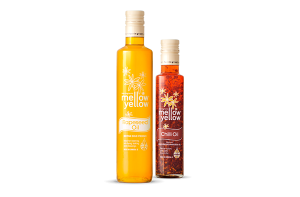 Oils
Oils Rapeseed Oil
Rapeseed Oil Chili Oil
Chili Oil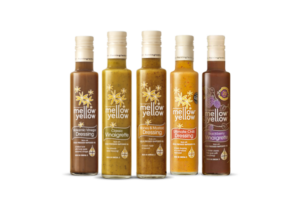 Dressings
Dressings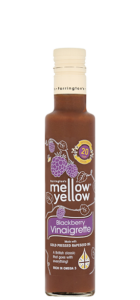 Blackberry Vinaigrette
Blackberry Vinaigrette Classic Vinaigrette
Classic Vinaigrette Balsamic Dressing
Balsamic Dressing Honey & Mustard
Honey & Mustard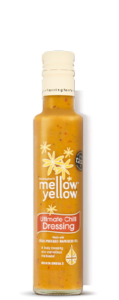 Ultimate Chilli Dressing
Ultimate Chilli Dressing